[牛津中小学英语网]改一般疑问句、否定、特殊句
牛津中小学英语网一般现在时
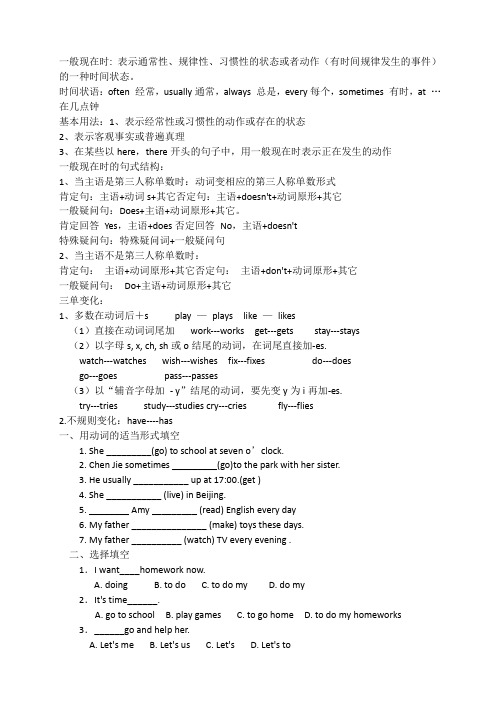
一般现在时: 表示通常性、规律性、习惯性的状态或者动作(有时间规律发生的事件)的一种时间状态。
时间状语:often 经常,usually通常,always 总是,every每个,sometimes 有时,at …在几点钟基本用法:1、表示经常性或习惯性的动作或存在的状态2、表示客观事实或普遍真理3、在某些以here,there开头的句子中,用一般现在时表示正在发生的动作一般现在时的句式结构:1、当主语是第三人称单数时:动词变相应的第三人称单数形式肯定句:主语+动词s+其它否定句:主语+doesn't+动词原形+其它一般疑问句:Does+主语+动词原形+其它。
肯定回答Yes,主语+does否定回答No,主语+doesn't特殊疑问句:特殊疑问词+一般疑问句2、当主语不是第三人称单数时:肯定句:主语+动词原形+其它否定句:主语+don't+动词原形+其它一般疑问句:Do+主语+动词原形+其它三单变化:1、多数在动词后+s play —plays like —likes(1)直接在动词词尾加work---works get---gets stay---stays(2)以字母s, x, ch, sh或o结尾的动词,在词尾直接加-es.watch---watches wish---wishes fix---fixes do---doesgo---goes pass---passes(3)以“辅音字母加- y”结尾的动词,要先变y为i再加-es.try---tries study---studies cry---cries fly---flies2.不规则变化:have----has一、用动词的适当形式填空1. She _________(go) to school at seven o’clock.2. Chen Jie sometimes _________(go)to the park with her sister.3. He usually ___________ up at 17:00.(get )4. She ___________ (live) in Beijing.5. ________ Amy _________ (read) English every day6. My father _______________ (make) toys these days.7. My father __________ (watch) TV every evening .二、选择填空1.I want____homework now.A. doingB. to doC. to do myD. do my2.It's time______.A. go to schoolB. play gamesC. to go homeD. to do my homeworks3.______go and help her.A. Let's meB. Let's usC. Let'sD. Let's to4.Do they have a new car Yes,_____.A .they are have C. they don't D. they do5.He often _________ supper at 6:00 in the evening.A. haveB. has c. is having D. is eating6. We _____________ any Chinese classes on Friday.A. are havingB. aren’t havingC. don’t haveD. are have三、用括号内动词的适当形式填空。
[牛津中小学英语网]改一般疑问句、否定、特殊句
![[牛津中小学英语网]改一般疑问句、否定、特殊句](https://img.taocdn.com/s3/m/c5908c97bb4cf7ec4afed0f3.png)
一般疑问句1、Cinderella has a good time at the party.(改为一般疑问句)Cinderella a good time at the party?2、I can put the ball on my finger.(改为一般疑问句)The ball on finger?3、We have a good time at the party.(改为一般疑问句)a good time at the party?4、My home is far from my school.(改为一般疑问句)home far from school?5、Mike goes to school by car.(改为一般疑问句)Mike to school by car?6、The old man asks a policeman for help.改为一般疑问句)the old man a policeman for help?7、My father walks to school the shop.(改为一般疑问句)father to the shop?8、I want to visit Beijing .(改为一般疑问句)to visit Beijing?9、They get to the cinema by metro.(改为一般疑问句)they to the cinema by metro?10、The film is over now.(改为一般疑问句)The film now?11、I’m on the bus now.(改为一般疑问句)On the bus now?12、Mike waits for the bus at the bus stop.(改为一般疑问句)Mike for the bus at the stop?13、He goes to see the dentist.(改为一般疑问句)he see the dentist?14、There is some water in the glass.(改为一般疑问句)in the glass?15、You should put the sweets in the box.(改为一般疑问句)the sweets in the box?16、Nancy has a cold and a fever.(改为一般疑问句)Nancy a cold a fever?改否定句1、The shoe fits Cinderella’s sisters.(改为否定句)The shoe Cinderella’s sisters.2、Helen has many nice clothes and shoes.(改为否定句)Helen many nice clothes shoes.3、We can eat a lot of snacks.(改为否定句)We a lot of snacks.(改为否定句)4、Many woman try on the dress.(改为否定句)Many woman on the dress5、There are some mushrooms under the tree.(改为否定句)There mushrooms under the tree.6、I visit my uncle every year.I my uncle every year.7、mike likes his new bike.(改为否定句)Mike his new bike.8、There is a train running through our town.(改为否定句)a train running through our town.9、Bobby’s dad does not think so.(改为肯定句)Bobby’s dad .10、There are some shops on the street.(改为否定句)shops on the street.11、Go along this street.along this street.12、We’re too late.(改为否定句)too late.13、Turn right at the traffic lights.(改为否定句)at the traffic lights.14、There are many buses at the bus stop.(改为单数句)at the bus stop.15、Please turn left.Please left .16、We should eat too many sweets.(改为否定句)We eat too many sweets.17、Does Yang Ling want to have a rest?(改为陈述句)Yang Ling have a rest.18、my mother feels happy every day.(改为否定句)My mother happy every day.19、Do you brush your teeth before bedtime?(改为陈述句)I teeth before bedtime.20、I can eat something in class.(改为否定句)I in class.对划线部分提问1、The prince visit every house.(对划线提问)the prince ?2、Many girls try on the shoe.(对划线提问)the girls try on?3、Bobby is sad.(用why 改为特殊疑问句)Bobby sad?4、The girls try on Cinderella’s shoe.(对划线部分提问)the girls try on?5、Liu Tao has to come back at five o’clock.(对划线部分提问)Liu Tao to come back?6、I can see a fairy in the sky.in the sky?7、Mike comes to school by taxi.(对划线部分提问)Mike to school?8、My father is a teacher.(对划线部分提问)father?9、Tim goes to school by bus.Tim to school?10、I have breakfast at six thirty every day.(对划线部分提问)breakfast every day?11、Nancy likes riding bikes.(对划线部分提问)Nancy like doing?12、Ben comes from the US.Ben from?13、Lily and Lucy go to school on foot.(对划线部分提问)Lily and Lucy to school?14、My home is next to the cinema.(对划线部分提问)your home?15、I take a bus to go to school.(对划线部分提问)you go to school?16、Yang Ling turns right at the traffic lights.(对划线部分提问)Yang Ling right?17、I can get to the hospital by bus.(对划线部分提问)can to the hospital?18、There are many cars in the street.(对划线部分提问)In the street?19、They are waiting for the bus at the bus stop.(对划线部分提问)they for at the bus stop? 20、We visit the zoo on Sundays.(对划线部分提问)do you on Sundays?21、He has a toothache.(用why改为特殊疑问句)he a toothache?22、She should drink some warm water.(对划线部分提问)should she ?23、They have a cold.(对划线部分提问)them?24、I should take some medicine.(对划线部分提问)you ?25、I want to help my mother.(对划线部分提问)do you to help?26、Liu Tao has a bad headache.(对划线部分提问)with Liu Tao?27、He feels thirty.(对划线部分提问)does he feel?。
牛津译林版七年级上册句型转化(陈述句,否定句,一般疑问句,特殊疑问句)
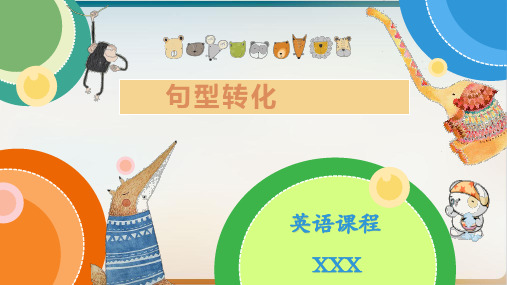
特殊疑问词
how often
How often do you go swimming?
I go swimming three times a week. how often: 对频率提问,意为“多久(一次)”
特殊疑问词
特殊疑问词
who
Who is your best friend ?
Who do you like to play with ?
who: 对人提问 ,意为“谁”,可作主语、宾 语
特殊疑问词
whose
Whose pen is this ?
Whose classmate is he ?
whose: 对所属关系提问,意为“谁的”, 可对人或物提问
例句总结
I can’t swim well, either.
too 变 either
I don’t have any money with me.
some 变 any
I don’t have a pen or a pencil.
and 变 or
She doesn’t have a friend. has – have :动词变原形
how far: 对距离提问,意为“多远”
特殊疑问词
易错点分析
特殊疑问词易错点分析
how far & how long
how long: 强调的是“物体长 短”
how far: 强调的是“距离”
特殊疑问词易错点分析
how long & when
how long: 强调的是“一段时 间”
when: 强调的是“某个时候”
牛津译林版七年级上句型转化(陈述句,否定句,一般疑问句,特殊疑问句)
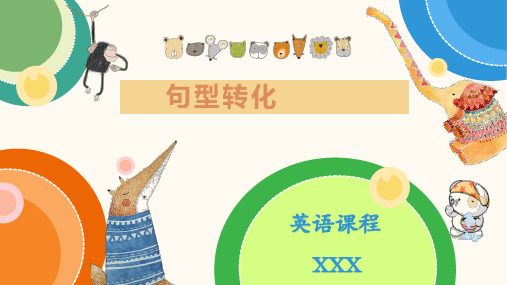
句型转化
肯定句结构总结
主语 + be 动词 + 其它 主语 + 情态动词 + 其它 主语 + 动词 + 其它
牛津译林版七年级上句型转化(陈述 句,否 定句, 一般疑 问句, 特殊疑 问句) (优秀 课件) 牛津译林版七年级上句型转化(陈述 句,否 定句, 一般疑 问句, 特殊疑 问句) (优秀 课件)
肯定句改否定句 注意点总结
牛津译林版七年级上句型转化(陈述 句,否 定句, 一般疑 问句, 特殊疑 问句) (优秀 课件)
肯定句改否定句的注意点
例句分析
I can’t swim well, either.
I don’t have any money with me.
I don’t have a pen or a pencil. She doesn’t have a friend.
改一般疑问句的注意点
例句分析
Do you like jogging ?
Do you have any good ideas ?
Does she have a boy friend ? Did they do very well ?
牛津译林版七年级上句型转化(陈述 句,否 定句, 一般疑 问句, 特殊疑 问句) (优秀 课件)
牛津译林版七年级上句型转化(陈述 句,否 定句, 一般疑 问句, 特殊疑 问句) (优秀 课件)
He can’t swim.
牛津译林版七年级上句型转化(陈述 句,否 定句, 一般疑 问句, 特殊疑 问句) (优秀 课件)
He doesn’t have meals for five days.
牛津译林版七年级上句型转化(陈述 句,否 定句, 一般疑 问句, 特殊疑 问句) (优秀 课件)
一般疑问句和否定句的改法 特殊疑问句改写
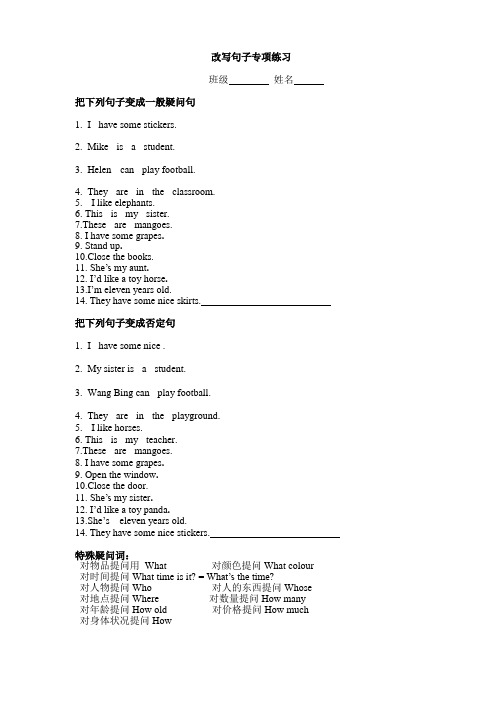
改写句子专项练习班级姓名把下列句子变成一般疑问句1. I have some stickers._______________________________________2. Mike is a student._______________________________________3. Helen can play football.________________________________________4. They are in the classroom.________________________________________5. I like elephants.________________________________________6. This is my sister._________________________________________7.These are mangoes.__________________________________________8. I have some grapes._________________________________9. Stand up._________________________________10.Close the books.________________________________11. She’s my aunt.________________________________________________12. I’d like a toy horse._______________________________13.I’m eleven years old. _____________________________________________14. They have some nice skirts.把下列句子变成否定句1. I have some nice ._______________________________________2. My sister is a student._______________________________________3. Wang Bing can play football.________________________________________4. They are in the playground.________________________________________5. I like horses.________________________________________6. This is my teacher._________________________________________7.These are mangoes.__________________________________________8. I have some grapes._________________________________9. Open the window._________________________________10.Close the door.________________________________11. She’s my sister.________________________________________________12. I’d like a toy panda._______________________________13.She’s eleven years old. _____________________________________________14. They have some nice stickers.特殊疑问词:对物品提问用What 对颜色提问What colour对时间提问What time is it? = What’s the time?对人物提问Who 对人的东西提问Whose对地点提问Where 对数量提问How many对年龄提问How old 对价格提问How much对身体状况提问How。
(完整版)小学英语一般疑问句、否定句和特殊疑问(附习题)(可编辑修改word版)
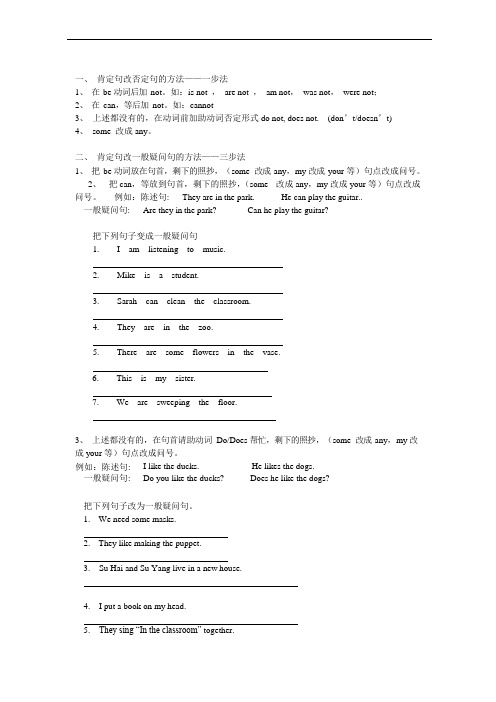
一、肯定句改否定句的方法——一步法1、在be 动词后加not。
如:is not ,are not ,am not,was not,were not;2、在can,等后加not。
如:cannot3、上述都没有的,在动词前加助动词否定形式do not, does not. (don’t/doesn’t)4、some 改成any。
二、肯定句改一般疑问句的方法——三步法1、把be 动词放在句首,剩下的照抄,(some 改成any,my 改成your 等)句点改成问号。
2、把can,等放到句首,剩下的照抄,(some 改成any,my 改成your 等)句点改成问号。
例如:陈述句: They are in the park. He can play the guitar..一般疑问句: Are they in the park? Can he play the guitar?把下列句子变成一般疑问句1. I am listening to music.2. Mike is a student.3. Sarah can clean the classroom.4. They are in the zoo.5. There are some flowers in the vase.6.This is my sister.7.We are sweeping the floor.3、上述都没有的,在句首请助动词Do/Does 帮忙,剩下的照抄,(some 改成any,my 改成your 等)句点改成问号。
例如:陈述句: I like the ducks. He likes the dogs.一般疑问句: Do you like the ducks? Does he like the dogs?把下列句子改为一般疑问句。
1.We need some masks.2.They like making the puppet.3.Su Hai and Su Yang live in a new house.4.I put a book on my head.5.They sing “In the classroom” together.6.We play basketball on Sundays.7.Tom likes listening to music三、肯定句改特殊疑问句的方法——四步法1、在一般疑问句的基础上,句首添加一个疑问词即可,可根据划线部分确定是什么疑问词。
牛津中小学英语网改一般疑问句、否定、特殊句
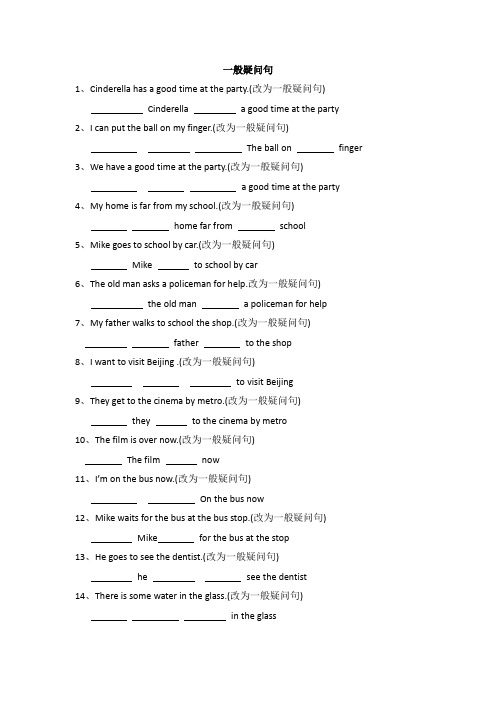
一般疑问句1、Cinderella has a good time at the party.(改为一般疑问句)Cinderella a good time at the party2、I can put the ball on my finger.(改为一般疑问句)The ball on finger3、We have a good time at the party.(改为一般疑问句)a good time at the party4、My home is far from my school.(改为一般疑问句)home far from school5、Mike goes to school by car.(改为一般疑问句)Mike to school by car6、The old man asks a policeman for help.改为一般疑问句)the old man a policeman for help7、My father walks to school the shop.(改为一般疑问句)father to the shop8、I want to visit Beijing .(改为一般疑问句)to visit Beijing9、They get to the cinema by metro.(改为一般疑问句)they to the cinema by metro10、The film is over now.(改为一般疑问句)The film now11、I’m on the bus now.(改为一般疑问句)On the bus now12、Mike waits for the bus at the bus stop.(改为一般疑问句)Mike for the bus at the stop13、He goes to see the dentist.(改为一般疑问句)he see the dentist14、There is some water in the glass.(改为一般疑问句)in the glass15、You should put the sweets in the box.(改为一般疑问句)the sweets in the box 16、Nancy has a cold and a fever.(改为一般疑问句)Nancy a cold a fever改否定句1、The shoe fits Cinderella’s sisters.(改为否定句)The shoe Cinderella’s sisters.2、Helen has many nice clothes and shoes.(改为否定句)Helen many nice clothes shoes.3、We can eat a lot of snacks.(改为否定句)We a lot of snacks.(改为否定句)4、Many woman try on the dress.(改为否定句)Many woman on the dress5、There are some mushrooms under the tree.(改为否定句)There mushrooms under the tree.6、I visit my uncle every year.I my uncle every year.7、mike likes his new bike.(改为否定句)Mike his new bike.8、There is a train running through our town.(改为否定句)a train running through our town.9、Bobby’s dad does not think so.(改为肯定句)Bobby’s dad .10、There are some shops on the street.(改为否定句)shops on the street.11、Go along this street.along this street.12、We’re too late.(改为否定句)too late.13、Turn right at the traffic lights.(改为否定句)at the traffic lights.14、There are many buses at the bus stop.(改为单数句)at the bus stop.15、Please turn left.Please left .16、We should eat too many sweets.(改为否定句)We eat too many sweets.17、Does Yang Ling want to have a rest(改为陈述句)Yang Ling have a rest.18、my mother feels happy every day.(改为否定句)My mother happy every day.19、Do you brush your teeth before bedtime(改为陈述句)I teeth before bedtime.20、I can eat something in class.(改为否定句)I in class.对划线部分提问1、The prince visit every house.(对划线提问)the prince2、Many girls try on the shoe.(对划线提问)the girls try on3、Bobby is sad.(用why 改为特殊疑问句)Bobby sad4、The girls try on Cinderella’s shoe.(对划线部分提问)the girls try on5、Liu Tao has to come back at five o’clock.(对划线部分提问)Liu Tao to come back6、I can see a fairy in the sky.in the sky7、Mike comes to school by taxi.(对划线部分提问)Mike to school8、My father is a teacher.(对划线部分提问)father9、Tim goes to school by bus.Tim to school10、I have breakfast at six thirty every day.(对划线部分提问)breakfast every day 11、Nancy likes riding bikes.(对划线部分提问)Nancy like doing12、Ben comes from the US.Ben from13、Lily and Lucy go to school on foot.(对划线部分提问)Lily and Lucy to school14、My home is next to the cinema.(对划线部分提问)your home15、I take a bus to go to school.(对划线部分提问)you go to school16、Yang Ling turns right at the traffic lights.(对划线部分提问)Yang Ling right17、I can get to the hospital by bus.(对划线部分提问)can to the hospital18、There are many cars in the street.(对划线部分提问)In the street19、They are waiting for the bus at the bus stop.(对划线部分提问)they for at the bus stop 20、We visit the zoo on Sundays.(对划线部分提问)do you on Sundays21、He has a toothache.(用why改为特殊疑问句)he a toothache22、She should drink some warm water.(对划线部分提问)should she23、They have a cold.(对划线部分提问)them24、I should take some medicine.(对划线部分提问)you25、I want to help my mother.(对划线部分提问)do you to help26、Liu Tao has a bad headache.(对划线部分提问)with Liu Tao27、He feels thirty.(对划线部分提问)does he feel。
完美--英语中把陈述句改为一般疑问句和特殊疑问句,否定句方法总结
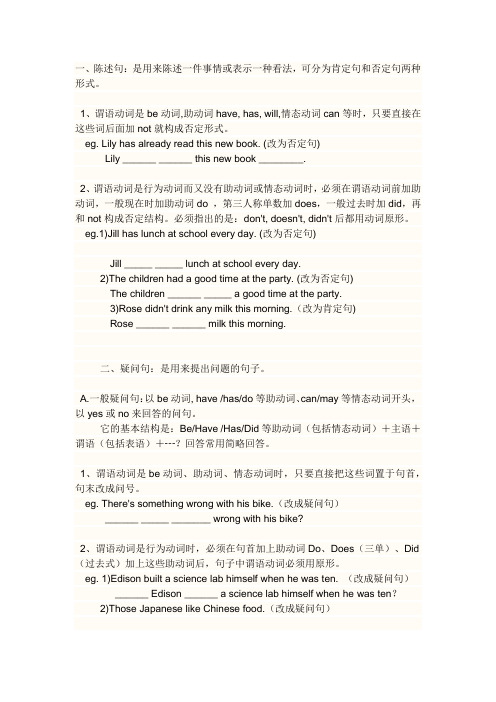
一、陈述句:是用来陈述一件事情或表示一种看法,可分为肯定句和否定句两种形式。
1、谓语动词是be动词,助动词have, has, will,情态动词can等时,只要直接在这些词后面加not就构成否定形式。
eg. Lily has already read this new book. (改为否定句)Lily ______ ______ this new book ________.2、谓语动词是行为动词而又没有助动词或情态动词时,必须在谓语动词前加助动词,一般现在时加助动词do ,第三人称单数加does,一般过去时加did,再和not构成否定结构。
必须指出的是:don't, doesn't, didn't后都用动词原形。
eg.1)Jill has lunch at school every day. (改为否定句)Jill _____ _____ lunch at school every day.2)The children had a good time at the party. (改为否定句)The children ______ _____ a good time at the party.3)Rose didn't drink any milk this morning.(改为肯定句)Rose ______ ______ milk this morning.二、疑问句:是用来提出问题的句子。
A.一般疑问句:以be动词, have /has/do等助动词、can/may等情态动词开头,以yes或no来回答的问句。
它的基本结构是:Be/Have /Has/Did等助动词(包括情态动词)+主语+谓语(包括表语)+┄?回答常用简略回答。
1、谓语动词是be动词、助动词、情态动词时,只要直接把这些词置于句首,句末改成问号。
eg. There's something wrong with his bike.(改成疑问句)______ _____ _______ wrong with his bike?2、谓语动词是行为动词时,必须在句首加上助动词Do、Does(三单)、Did (过去式)加上这些助动词后,句子中谓语动词必须用原形。
[牛津中小学英语网]改一般疑问句、否定、特殊句
![[牛津中小学英语网]改一般疑问句、否定、特殊句](https://img.taocdn.com/s3/m/83fbdd735ef7ba0d4b733b01.png)
一般疑问句1、Cinderella has a good time at the party.(改为一般疑问句) Cinderella a good time at the party2、I can put the ball on my finger.(改为一般疑问句)The ball on finger3、We have a good time at the party.(改为一般疑问句)a good time at the party4、My home is far from my school.(改为一般疑问句)home far from school5、Mike goes to school by car.(改为一般疑问句)Mike to school by car6、The old man asks a policeman for help.改为一般疑问句)the old man a policeman for help7、My father walks to school the shop.(改为一般疑问句)father to the shop8、I want to visit Beijing .(改为一般疑问句)to visit Beijing9、They get to the cinema by metro.(改为一般疑问句)they to the cinema by metro10、The film is over now.(改为一般疑问句)The film now11、I’m on the bus now.(改为一般疑问句)On the bus now12、Mike waits for the bus at the bus stop.(改为一般疑问句) Mike for the bus at the stop13、He goes to see the dentist.(改为一般疑问句)he see the dentist14、There is some water in the glass.(改为一般疑问句)in the glass15、You should put the sweets in the box.(改为一般疑问句) the sweets in the box16、Nancy has a cold and a fever.(改为一般疑问句)Nancy a cold a fever改否定句1、The shoe fits Cinderella’s sisters.(改为否定句)The shoe Cinderella’s sisters.2、Helen has many nice clothes and shoes.(改为否定句)Helen many nice clothes shoes.3、We can eat a lot of snacks.(改为否定句)We a lot of snacks.(改为否定句)4、Many woman try on the dress.(改为否定句)Many woman on the dress5、There are some mushrooms under the tree.(改为否定句)There mushrooms under the tree.6、I visit my uncle every year.I my uncle every year.7、mike likes his new bike.(改为否定句)Mike his new bike.8、There is a train running through our town.(改为否定句)a train running through our town.9、Bobby’s dad does not think so.(改为肯定句)Bobby’s dad .10、There are some shops on the street.(改为否定句)shops on the street.11、Go along this street.along this street.12、We’re too late.(改为否定句)too late.13、Turn right at the traffic lights.(改为否定句)at the traffic lights. 14、There are many buses at the bus stop.(改为单数句) at the bus stop. 15、Please turn left.Please left .16、We should eat too many sweets.(改为否定句)We eat too many sweets.17、Does Yang Ling want to have a rest(改为陈述句)Yang Ling have a rest.18、my mother feels happy every day.(改为否定句)My mother happy every day.19、Do you brush your teeth before bedtime(改为陈述句)I teeth before bedtime.20、I can eat something in class.(改为否定句)I in class.对划线部分提问1、The prince visit every house.(对划线提问)the prince2、Many girls try on the shoe.(对划线提问)the girls try on3、Bobby is sad.(用why 改为特殊疑问句)Bobby sad4、The girls try on Cinderella’s shoe.(对划线部分提问)the girls try on5、Liu Tao has to come back at five o’clock.(对划线部分提问) Liu Tao to come back6、I can see a fairy in the sky.in the sky7、Mike comes to school by taxi.(对划线部分提问)Mike to school8、My father is a teacher.(对划线部分提问)father9、Tim goes to school by bus.Tim to school10、I have breakfast at six thirty every day.(对划线部分提问)breakfast every day11、Nancy likes riding bikes.(对划线部分提问)Nancy like doing12、Ben comes from the US.Ben from13、Lily and Lucy go to school on foot.(对划线部分提问)Lily and Lucy to school14、My home is next to the cinema.(对划线部分提问)your home15、I take a bus to go to school.(对划线部分提问)you go to school16、Yang Ling turns right at the traffic lights.(对划线部分提问) Yang Ling right17、I can get to the hospital by bus.(对划线部分提问)can to the hospital18、There are many cars in the street.(对划线部分提问)In the street19、They are waiting for the bus at the bus stop.(对划线部分提问) they for at the bus stop20、We visit the zoo on Sundays.(对划线部分提问)do you on Sundays21、He has a toothache.(用why改为特殊疑问句)he a toothache22、She should drink some warm water.(对划线部分提问)should she23、They have a cold.(对划线部分提问)them24、I should take some medicine.(对划线部分提问) you25、I want to help my mother.(对划线部分提问)do you to help26、Liu Tao has a bad headache.(对划线部分提问) with Liu Tao27、He feels thirty.(对划线部分提问)does he feel。
[牛津中小学英语网]【模块五】6考点精练
![[牛津中小学英语网]【模块五】6考点精练](https://img.taocdn.com/s3/m/865cf37f561252d380eb6ecf.png)
飞速英语模块四考点精练6年级下册Unit 1A卷: 课堂点拨题一.一般过去式1. there be的过去式(1)【易错】______ there any people here yesterday? No, but there _______some people today.A. Are, areB. Is , isC. Was, isD. Were , are(2)【易错】There _______ ( be ) any milk in the glass just now.2.过去式的不规则变化(1)The lion let the mouse ______. A. go B. goes C. went(2)【易错】The mouse helped the lion _______ . A. get out B. got out C. get up(3)At last, the policeman ________ ( let ) the man _______ ( go ) .(4)—What did the lion and the mouse__________(become)? —They___________(become)friends.4.关于“过去式”的几个时间状语(1) , the mouse saw the hot dog. A. From then on B. Just then C. Now(2)One day, some _________ ( mouse ) walked by and ________ ( wake ) the lions up.(3)The ______ ( three ) day, the man _______ ( catch ) _______ (many) fish and cooked for his family.二.ly副词【动配副】【be配形】【注意:系动词become变成/ feel感到/ keep保持,相当于be动词,后面也用形容词】1.写出下列形容词的副词quiet _______ beautiful________ happy_________ angry good________ excited__________ fast __________2.【易错】The king was . A. tall and strong B. happily C. quietly3.【易错】The woman is . She is crying . A. happily,happy B. sadly,sad C. sad ,sadly4.It’s my birthday today. I’m very_________. A. sad B. happy C. happily5.I can walk _____. A. fast B. quick C. happy三.有can的“肯定句” 和“特殊疑问句”1.你能怎样帮我?How ______ ______ ______ ______ ?2. I can help you with my teeth.(对画线部分提问)四.介词短语:with... 用...【和汉语顺序不同,方式状语放最后】【学会和use的转换】1.Three girls the bird a bag. A. caught to B. catches in C. caught with2.The lion bit the net with his sharp teeth.(用use改写句子)五. 补充的短语1.Billy and Bobby _____ for _____. A. cheer,them B. cheers,them C. cheer,they2.It's late. ,please. A. Wake up her B. Wake she up C. Wake her up3.Can you help me the ball? A. look for B. looked for C. looks forB卷: 课后巩固题一.选择( )1.He listens to his teachers . A. careful B. sadly C. carefully( )2.【易错】The boy became . A.happily B.happy C.happyly( )3.【易错】This race is interesting. They feel . A. excited B.exciting C. excitedly( )4.They pour the water the hole. A.to B.on C.into( )5.Sam hit Bobby's head _____. A. hardly B.quick C. hard( )6.【易错】Don't shout . Please keep . A.loud;quietly B. loudly;quiet C. loudly;quietly ( )7.How can the mouse the lion? A.helping B.helps C.help( )8.The maths problem(问题) is _______ and I can do it________.A. easy easilyB.easily easilyC.easy easyD. easily easy( )9.There are some little ______ in the hole. A. mouse B. mice C. mouses( )10.Mike help Mr Green clean the office. A.not B.don't C.didn't D.was二.填入适当的词1.quiet(副词)2.say(过去式)3.wake(过去式)4.give(过去式)5.catch(过去式)6.happily(形容词)7.let(原形)8.bite(过去式)9.become(过去式) 10.week(同音词) 11.catch(过去式) 12.mouse(复数)13.bring(过去式) 14.hit (过去式)15.--What _______ they _________ ( do ) in the playground ? --They are running.16.The bear is the meat. (bite)17.Would you like ______ (eat) some mushrooms?18.Two _____(man) _________(catch) the lion with a large net two days ago.19.【易错】He always __________(hit) the ball hard.20.The boy was __________. He laughed __________. ( excited )21.【易错】He did the work very __________.(care)22.【易错】He’s very ___________(care) with his money.23.The students are sweeping . (careful)24.【易错】My mother is very_______. (beautifully)25.Yang Ling ______ (walk) by and saw a nice ladybird.26.【易错】they ______ (take) photos tomorrow?27.The girl likes reading. Now she is reading ___________. ( loud )28.My sister is _________ at swimming. She swims ________. ( good )29.Mr Brown poured the juice into the glass . (quick)30.【易错】" Don't play football in the street." The policeman shouted at the children _______. (angry生气)31.I feel ________ ( excite ) about the _________ ( excite ) film.32.Ben is _________(quiet) in the library.33.【易错】The children laughed __________(excited).34.We should read _________ in the library. ( quiet )35.【易错】Those flowers are ________beautiful (real).36.【易错】Hit the volleyball (hard),please.37.Football is________ (excite). Everyone is_________ (excite) when he is watching a football match.38.Jim walked __________(quiet) in the classroom.39.The twins ___________ (sit) there __________( sad) now.40.【易错】Yao Ming is good at _______ ( play ) basketball. He is a good basketball _______ ( play ). 三.翻译1.出来2.就在那3. 走过,路过4.把……倒入5.第二天6.打乒乓球打得开心7.擅长踢足球8.为我欢呼9.静静地坐10.开心地说11.很久很久以前,森林里有许多狮子吗?是的,有。
(完整版)小学英语一般疑问句、否定句和特殊疑问(附习题)(可编辑修改word版)

(完整版)⼩学英语⼀般疑问句、否定句和特殊疑问(附习题)(可编辑修改word版)⼀、肯定句改否定句的⽅法——⼀步法1、在be 动词后加not。
如:is not ,are not ,am not,was not,were not;2、在can,等后加not。
如:cannot3、上述都没有的,在动词前加助动词否定形式do not, does not. (don’t/doesn’t)4、some 改成any。
⼆、肯定句改⼀般疑问句的⽅法——三步法1、把be 动词放在句⾸,剩下的照抄,(some 改成any,my 改成your 等)句点改成问号。
2、把can,等放到句⾸,剩下的照抄,(some 改成any,my 改成your 等)句点改成问号。
例如:陈述句: They are in the park. He can play the guitar..⼀般疑问句: Are they in the park? Can he play the guitar?把下列句⼦变成⼀般疑问句1. I am listening to music.2. Mike is a student.3. Sarah can clean the classroom.4. They are in the zoo.5. There are some flowers in the vase.6.This is my sister.7.We are sweeping the floor.3、上述都没有的,在句⾸请助动词Do/Does 帮忙,剩下的照抄,(some 改成any,my 改成your 等)句点改成问号。
例如:陈述句: I like the ducks. He likes the dogs.⼀般疑问句: Do you like the ducks? Does he like the dogs?把下列句⼦改为⼀般疑问句。
1.We need some masks.2.They like making the puppet.3.Su Hai and Su Yang live in a new house.4.I put a book on my head.5.They sing “In the classroom” together.6.We play basketball on Sundays.7.Tom likes listening to music三、肯定句改特殊疑问句的⽅法——四步法1、在⼀般疑问句的基础上,句⾸添加⼀个疑问词即可,可根据划线部分确定是什么疑问词。
牛津小学英语句型转换
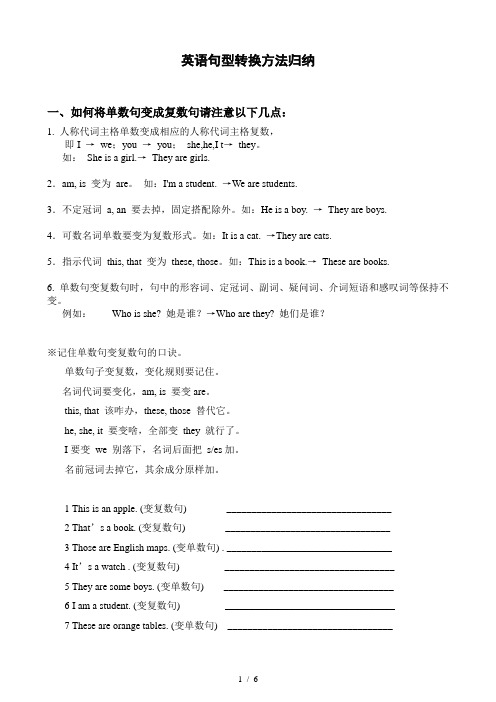
英语句型转换方法归纳一、如何将单数句变成复数句请注意以下几点:1. 人称代词主格单数变成相应的人称代词主格复数,即I →we;you →you;she,he,I t→they。
如:She is a girl.→They are girls.2.am, is 变为are。
如:I'm a student. →We are students.3.不定冠词a, an 要去掉,固定搭配除外。
如:He is a boy. →They are boys.4.可数名词单数要变为复数形式。
如:It is a cat. →They are cats.5.指示代词this, that 变为these, those。
如:This is a book.→These are books.6. 单数句变复数句时,句中的形容词、定冠词、副词、疑问词、介词短语和感叹词等保持不变。
例如:Who is she? 她是谁?→Who are they? 她们是谁?※记住单数句变复数句的口诀。
单数句子变复数,变化规则要记住。
名词代词要变化,am, is 要变are。
this, that 该咋办,these, those 替代它。
he, she, it 要变啥,全部变they 就行了。
I要变we 别落下,名词后面把s/es加。
名前冠词去掉它,其余成分原样加。
1 This is an apple. (变复数句) _________________________________2 That’s a book. (变复数句) _________________________________3 Those are English maps. (变单数句) . _________________________________4 It’s a watch . (变复数句) __________________________________5 They are some boys. (变单数句) __________________________________6 I am a student. (变复数句) __________________________________7 These are orange tables. (变单数句) _________________________________二、改为一般疑问句1、先找be动词am, is, are, was, were或情态动词can, may ,must, would,should ,could .如果有这些词,直接把这些词放在句子最前面,some 改成any,句号改成问号!其余照抄;(如果主语是第一人称则变成第二人称)2、如果句子中没有be动词或者是情态动词,(只有实意动词,有实际动作的动词),要在句子最前面加助动词do 、does或者是did。
牛津小学英语改一般疑问句
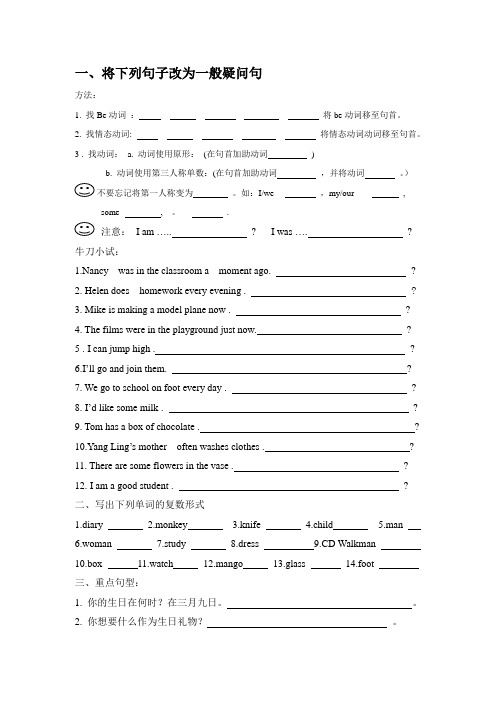
一、将下列句子改为一般疑问句方法:1. 找Be动词:将be动词移至句首。
2. 找情态动词: 将情态动词动词移至句首。
3 . 找动词:a. 动词使用原形:(在句首加助动词)b. 动词使用第三人称单数:(在句首加助动词,并将动词。
)不要忘记将第一人称变为。
如:I/we --- ,my/our ---- ,some-- , 。
---- .注意:I am ….. ? I was …. ? 牛刀小试:1.Nancy was in the classroom a moment ago. ?2. Helen does homework every evening . ?3. Mike is making a model plane now . ?4. The films were in the playground just now. ?5 . I can jump high . ?6.I’ll go and join them. ?7. We go to school on foot every day . ?8. I’d like some milk . ?9. Tom has a box of chocolate . ?10.Yang Ling’s mother often washes clothes . ?11. There are some flowers in the vase . ?12. I am a good student . ?二、写出下列单词的复数形式1.diary2.monkey3.knife4.child5.man6.woman7.study8.dress9.CD Walkman10.box 11.watch 12.mango 13.glass 14.foot三、重点句型:1. 你的生日在何时?在三月九日。
2. 你想要什么作为生日礼物?。
牛津译林七年级上册句型转化(陈述句,否定句,一般疑问句,特殊疑问句)
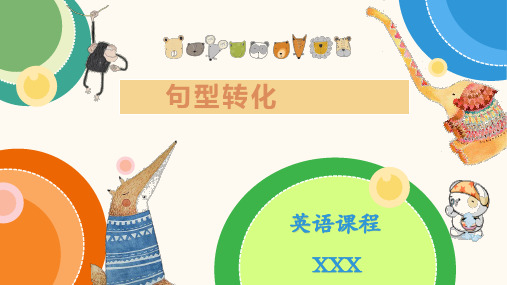
He is sad. He is unhappy. He is not happy.
牛津译林七年级上册句型转化(陈述 句,否 定句, 一般疑 问句, 特殊疑 问句) (精品 系列PPT )
牛津译林七年级上册句型转化(陈述 句,否 定句, 一般疑 问句, 特殊疑 问句) (精品 系列PPT )
He can’t swim.
句型转化
陈述句概念引入
陈述句(Declarative Sentence)是陈述一个事实或者说话人的看法的句型。 陈述句又分为肯定的陈述句和否定的陈述句
简称为肯定句和否定句。
牛津译林七年级上册句型转化(陈述 句,否 定句, 一般疑 问句, 特殊疑 问句) (精品 系列PPT )
牛津译林七年级上册句型转化(陈述 句,否 定句, 一般疑 问句, 特殊疑 问句) (精品 系列PPT ) 牛津译林七年级上册句型转化(陈述 句,否 定句, 一般疑 问句, 特殊疑 问句) (精品 系列PPT )
方法1:根据主语来提助动词
当主语为第三人称单数时,提出does
其余主语,提出do
牛津译林七年级上册句型转化(陈述 句,否 定句, 一般疑 问句, 特殊疑 问句) (精品 系列PPT )
did不用考虑主语
牛津译林七年级上册句型转化(陈述 句,否 定句, 一般疑 问句, 特殊疑 问句) (精品 系列PPT )
句型转化
哪些属于第三人称单数呢?
1.人称代词中的 he she it 2.单个的人、人名或地名 3.可数名词单数、不可数名词
4.不定代词something…
牛津译林七年级上册句型转化(陈述 句,否 定句, 一般疑 问句, 特殊疑 问句) (精品 系列PPT )
5.数字或字母
[牛津中小学英语网]按要求改写句子(unit7-8)
![[牛津中小学英语网]按要求改写句子(unit7-8)](https://img.taocdn.com/s3/m/120bd6332f60ddccda38a06e.png)
六年级按要求改写句子(unit7-8)1.I'll go to the park this Saturday.(一般疑问句,肯定回答)2.She’ll visit her grandparents tomorrow.(对画线部分提问)3.They’ll go to the UK for the holiday. (对画线部分提问)4.He’ll come back in May. (对画线部分提问)5.We'll visit London Eye.(改成否定句)6.Jill will go to school by bus next year. (对画线部分提问)7.My parents will watch a film this evening.(一般疑问句,否定回答)8.We'll make a big snowman tomorrow. (对画线部分提问)9.Peter will go to Hong Kong for the summer holiday. (对画线部分提问)10.She will show me some big fish.(同义句)11.John is going to play the piano at the party. (同义句)12.My sister wants to be a dancer. (对画线部分提问)13.Liu Tao went to Shanghai and visited the Bund last year. (用next year改写)14.She will stay in Beijing for two months. (对画线部分提问)15.They are going to sweep the floor.(一般疑问句)16.Sam will go to the zoo by bike.(否定句)17. I will go to Taipei. (对画线部分提问)18.I will stay in Beijing for two weeks. (对画线部分提问)19.I will read books on Sunday.(用he改写句子)20.My father will go swimming this afternoon.(一般疑问句)21.Will he visit his uncle?(否定回答)22.There was a tiger in the forest. (一般疑问句)23.The teacher knows the students well. (一般疑问句)24.Liu Tao has some bad habits.(否定句)25.We'll go to Ocean Park too. (否定句)26.Does Mike have a healthy diet?(改为陈述句)27.The cat and the dog became good friends at last.(改为否定句)28.Her mother has some noodles. (改为否定句)29.He often does his homework in his room. (一般疑问句)30.They don't keep their classroom clean.(肯定句)31.Mary never goes to school late. (对画线部分提问)32.He always puts his things in order. (改为否定句)33.The students should go to school late. (改为否定句)34.Listen to him. (改为否定句).35.I ate some eggs this morning. (一般疑问句)this morning?36.I will go to Beijing by plane. (对画线部分提问)37.He will go to Shanghai to visit his parents. (一般疑问句) ?38.I will go to Nanjing for two years. (对画线部分提问)?39.Yang Ling will go to London by plane. (对画线部分提问)?40.I will visit my grandparents in Nanjing. (对画线部分提问)41.People in the north often go skating in winter.(用next winter代替in winter)42.There are two cinemas in that town.(用next year改写)43.He comes back late.(用in two days改写)44.She is a nurse in the hospital.(用soon改写)45.Nancy is going to go camping. (改为否定句)46.I will go and join them. (改为否定句)47.I'm going to get up at six thirty tomorrow. (一般疑问句)48.We will meet at the bus stop at ten thirty. (一般疑问句)49.She will listen to music after school. (对画线部分提问)50.My father and mother will see a play the day after tomo rrow. (对画线部分提问)51.He is going to the zoo tomorrow.(用will改写)52.He will stay in Shanghai for a month. (对画线部分提问)53.They will play football after school. (对画线部分提问)54.I'll go to school on foot. (一般疑问句)55.She will go to the zoo this weekend. (一般疑问句)56.Sam wants to be a policeman.(同义句)57.He wants to be an artist because he likes painting. (对画线部分提问)58.he, go, will, to ,school, cooking(.)(连词成句)59.Lucy wants to be a scientist in the future. (一般疑问句)60.What's your dream?(根据问句写出答句)61.I watched a film last Sunday. (一般疑问句)62.I went to the farm for the holiday. (对画线部分提问)63.My holiday was great fun. (对画线部分提问)64. They visited their friends last week. (改为否定句)65.He wrote a letter to his dad in New York.(改为现在进行时).66.He does some exercises every morning. (一般疑问句)。
小学英语肯,否,一般,特殊句型转换完美版
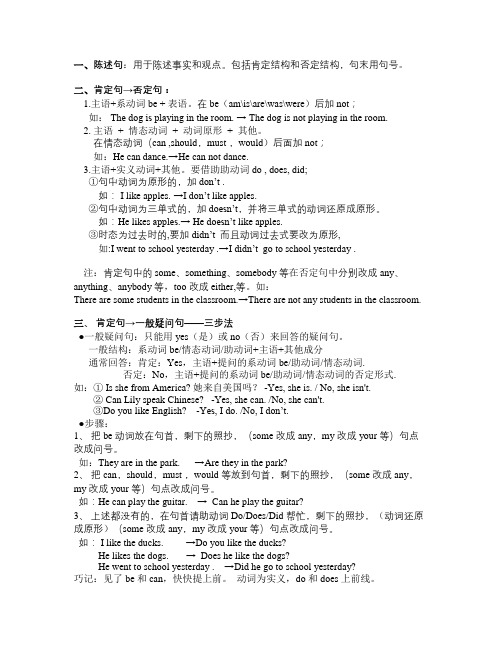
一、陈述句:用于陈述事实和观点。
包括肯定结构和否定结构,句末用句号。
二、肯定句→否定句:1.主语+系动词be + 表语。
在be(am\is\are\was\were)后加not;如:The dog is playing in the room. → The dog is not playing in the room.2. 主语+ 情态动词+ 动词原形+ 其他。
在情态动词(can ,should,must ,would)后面加not;如:He can dance.→H e can not dance.3.主语+实义动词+其他。
要借助助动词do , does, did;①句中动词为原形的,加don’t .如: I like apples. →I don’t like apples.②句中动词为三单式的,加doesn’t,并将三单式的动词还原成原形。
如:He likes apples.→ He doesn’t like apples.③时态为过去时的,要加didn’t而且动词过去式要改为原形,如:I went to school yesterday .→I didn’t go to school yesterday .注:肯定句中的some、something、somebody等在否定句中分别改成any、anything、anybody等,too改成either,等。
如:There are some students in the classroom.→There are not any students in the classroom.三、肯定句→一般疑问句——三步法●一般疑问句:只能用yes(是)或no(否)来回答的疑问句。
一般结构:系动词be/情态动词/助动词+主语+其他成分通常回答:肯定:Yes,主语+提问的系动词be/助动词/情态动词.否定:No,主语+提问的系动词be/助动词/情态动词的否定形式.如:① Is she from America? 她来自美国吗? -Yes, she is. / No, she isn't.② Can Lily speak Chinese? -Yes, she can. /No, she can't.③Do you like English? -Yes, I do. /No, I don’t.●步骤:1、把be动词放在句首,剩下的照抄,(some 改成any,my改成your等)句点改成问号。
改一般疑问句,肯,否回答,否定句,疑问句 特殊型转换专项训练
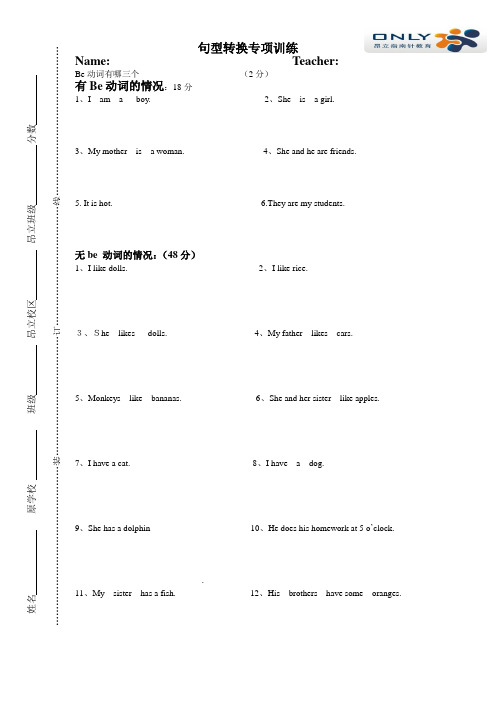
句型转换专项训练Name: Teacher:Be 动词有哪三个_______________________(2分) 有Be 动词的情况:18分1、I am a boy.2、She is a girl._____________________________ _____________________________ _____________________________ _____________________________ _____________________________ _____________________________ 3、My mother is a woman. 4、She and he are friends._____________________________ _____________________________ _____________________________ _____________________________ _____________________________ _____________________________ 5. It is hot. 6.They are my students._____________________________ _____________________________ _____________________________ _____________________________ _____________________________ _____________________________无be 动词的情况:(48分)1、I like dolls.2、I like rice._____________________________ _____________________________ _____________________________ _____________________________ _____________________________ _____________________________ _____________________________ _____________________________ 3、She likes dolls. 4、My father likes cars._____________________________ _____________________________ _____________________________ _____________________________ _____________________________ _____________________________ _____________________________ _____________________________ 5、Monkeys like bananas. 6、She and her sister like apples. _____________________________ ______________________________ _____________________________ ______________________________ _____________________________ ______________________________ _____________________________ ______________________________ 7、I have a cat. 8、I have a dog._____________________________ _______________________________ _____________________________ _______________________________ _____________________________ _______________________________ _____________________________ _______________________________ 9、She has a dolphin 10、He does his homework at 5 o ’clock. _____________________________ ________________________________ _____________________________ ________________________________ _____________________________ ________________________________ _____________________________. _________________________________ 11、My sister has a fish. 12、His brothers have some oranges. _____________________________ _________________________________ _____________________________ _________________________________ _____________________________ _________________________________姓名_____________ 原学校___________ 班级_________ 昂立校区___________昂立班级 _____ 分数__________…………………………………………装………………………………订………………………………线………………………………………_____________________________ __________________________________对划线部分提问(12分)1、My name is Mark._______________________________________________2、My sister is a nurse.________________________________________________3、I have two fingers.________________________________________________4、My uncl e’s name is Peter.________________________________________________5、Betty likes this cap.________________________________________________6、I go to bed at 7:30.________________________________________________7、It's four o'clock.________________________________________________8、I go to school on foot.________________________________________________9、She watches TV at the weekend.________________________________________________10、I see a film at the weekend._________________________________________________11、She is at home._________________________________________________12、My mother goes to grandma’s home by car.___________________________________________用动词的行当形式填空:20分1.What ______you_____ (do)at the weekend?2.I_____ (go)fishing at the weekend.3.What____ he _____(do) at the weekend?4.Morris _____ (watch) TV at the weekend.5.How____ you_____(go) to school.6.How _____ boys ____ (go) to the zoo?7.How many seasons_____(be) there in a year?8.The girl____(go) to school by bike.9.My cousins ______(like) robots.10.How many arms ____(do) he have?。
一般疑问句、否定句、特殊疑问句的改法
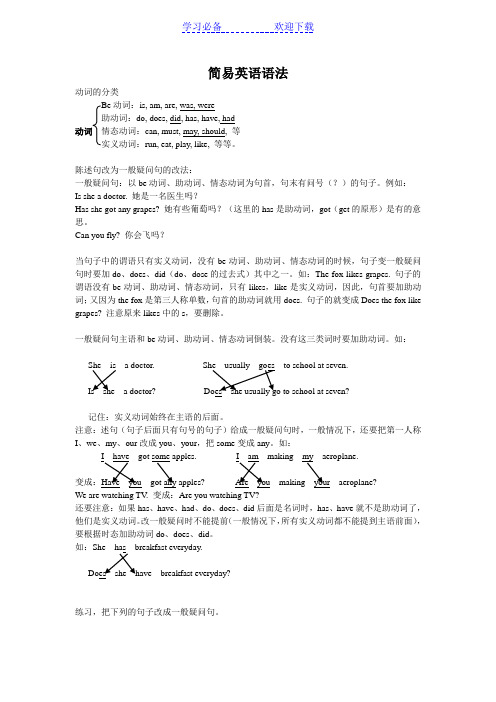
简易英语语法动词的分类Be动词:is, am, are, was, were助动词:do, does, did, has, have, had动词情态动词:can, must, may, should, 等实义动词:run, eat, play, like, 等等。
陈述句改为一般疑问句的改法:一般疑问句:以be动词、助动词、情态动词为句首,句末有问号(?)的句子。
例如:Is she a doctor. 她是一名医生吗?Has she got any grapes? 她有些葡萄吗?(这里的has是助动词,got(get的原形)是有的意思。
Can you fly? 你会飞吗?当句子中的谓语只有实义动词,没有be动词、助动词、情态动词的时候,句子变一般疑问句时要加do、does、did(do、dose的过去式)其中之一。
如:The fox likes grapes. 句子的谓语没有be动词、助动词、情态动词,只有likes,like是实义动词,因此,句首要加助动词;又因为the fox是第三人称单数,句首的助动词就用does. 句子的就变成Does the fox like grapes? 注意原来likes中的s,要删除。
一般疑问句主语和be动词、助动词、情态动词倒装。
没有这三类词时要加助动词。
如:She is a doctor. to school at seven.Is she a doctor? Does记住:实义动词始终在主语的后面。
注意:述句(句子后面只有句号的句子)给成一般疑问句时,一般情况下,还要把第一人称I、we、my、our改成you、your,把some变成any。
如:making变成:Have you got any apples? Are you your aeroplane?We are watching TV. 变成:Are you watching TV?还要注意:如果has、have、had、do、does、did后面是名词时,has、have就不是助动词了,他们是实义动词。
初中英语一般疑问句、否定句、特殊疑问句的改法
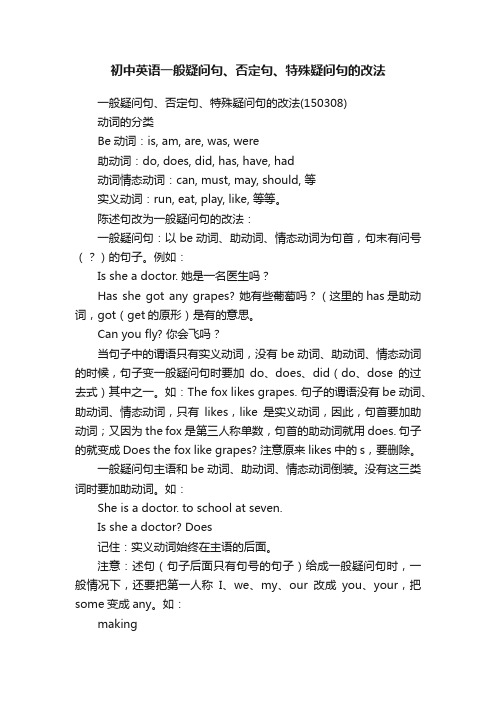
初中英语一般疑问句、否定句、特殊疑问句的改法一般疑问句、否定句、特殊疑问句的改法(150308)动词的分类Be动词:is, am, are, was, were助动词:do, does, did, has, have, had动词情态动词:can, must, may, should, 等实义动词:run, eat, play, like, 等等。
陈述句改为一般疑问句的改法:一般疑问句:以be动词、助动词、情态动词为句首,句末有问号(?)的句子。
例如:Is she a doctor. 她是一名医生吗?Has she got any grapes? 她有些葡萄吗?(这里的has是助动词,got(get的原形)是有的意思。
Can you fly? 你会飞吗?当句子中的谓语只有实义动词,没有be动词、助动词、情态动词的时候,句子变一般疑问句时要加do、does、did(do、dose的过去式)其中之一。
如:The fox likes grapes. 句子的谓语没有be动词、助动词、情态动词,只有likes,like是实义动词,因此,句首要加助动词;又因为the fox是第三人称单数,句首的助动词就用does. 句子的就变成Does the fox like grapes? 注意原来likes中的s,要删除。
一般疑问句主语和be动词、助动词、情态动词倒装。
没有这三类词时要加助动词。
如:She is a doctor. to school at seven.Is she a doctor? Does记住:实义动词始终在主语的后面。
注意:述句(句子后面只有句号的句子)给成一般疑问句时,一般情况下,还要把第一人称I、we、my、our改成you、your,把some变成any。
如:making变成:Have you got any apples? Are you your aeroplane?We are watching TV. 变成:Are you watching TV?还要注意:如果has、have、had、do、does、did后面是名词时,has、have就不是助动词了,他们是实义动词。
小学英语肯定句、否定句、一般疑问句和特殊疑问句的相互转换2

小学英语肯定句、否定句、一般疑问句和特殊疑问句的相互转
换2
没有am, is, are的句子,
肯定句变否定句:在主语后面加上do not或者does not,其余按顺序照抄动词用原形。
肯定句变一般疑问句:在句首加do或者does并大写,其余照抄。
注意:动词用原形。
肯定句变特殊疑问句(就划线部分提问):分3步骤。
第一步:先变一般疑问句。
第二步:找合适的特殊疑问词代替划线部分。
第三步:特殊疑问词提前放到句首,并大写,其余按顺序照抄,省略划线部分。
注意:1.一定先变一般疑问句。
但是,如果问的是主语或主语的定语时,语序不变,为'特殊疑问词(+主语)+陈述句'。
2.划线部分不能在特殊疑问句中出现。
非单三时用do, 单三时用does。
非单三肯定句:I like English.
一般疑问句:Do you like English?
否定句:I do not like English.
单三肯定句:He likes English.
一般疑问句:Does he like English?
否定句:He does not like English.
就划线部分提问:I like English.
第一步:先变一般疑问句 Do you like English?
第二步:找合适的特殊疑问词代替划线部分Do you like what?
第三步:特殊疑问词提前放到句首,并大写,其余按顺序照抄,省略划线部分。
What do you like?。
- 1、下载文档前请自行甄别文档内容的完整性,平台不提供额外的编辑、内容补充、找答案等附加服务。
- 2、"仅部分预览"的文档,不可在线预览部分如存在完整性等问题,可反馈申请退款(可完整预览的文档不适用该条件!)。
- 3、如文档侵犯您的权益,请联系客服反馈,我们会尽快为您处理(人工客服工作时间:9:00-18:30)。
一般疑问句
1、Cinderella has a good time at the party.(改为一般疑问句)
Cinderella a good time at the party?
2、I can put the ball on my finger.(改为一般疑问句)
The ball on finger?
3、We have a good time at the party.(改为一般疑问句)
a good time at the party?
4、My home is far from my school.(改为一般疑问句)
home far from school?
5、Mike goes to school by car.(改为一般疑问句)
Mike to school by car?
6、The old man asks a policeman for help.改为一般疑问句)
the old man a policeman for help?
7、My father walks to school the shop.(改为一般疑问句)
father to the shop?
8、I want to visit Beijing .(改为一般疑问句)
to visit Beijing?
9、They get to the cinema by metro.(改为一般疑问句)
they to the cinema by metro?
10、The film is over now.(改为一般疑问句)
The film now?
11、I’m on the bus now.(改为一般疑问句)
On the bus now?
12、Mike waits for the bus at the bus stop.(改为一般疑问句)
Mike for the bus at the stop?
13、He goes to see the dentist.(改为一般疑问句)
he see the dentist?
14、There is some water in the glass.(改为一般疑问句)
in the glass?
15、You should put the sweets in the box.(改为一般疑问句)
the sweets in the box?
16、Nancy has a cold and a fever.(改为一般疑问句)
Nancy a cold a fever?
改否定句
1、The shoe fits Cinderella’s sisters.(改为否定句)
The shoe Cinderella’s sisters.
2、Helen has many nice clothes and shoes.(改为否定句)
Helen many nice clothes shoes.
3、We can eat a lot of snacks.(改为否定句)
We a lot of snacks.(改为否定句)
4、Many woman try on the dress.(改为否定句)
Many woman on the dress
5、There are some mushrooms under the tree.(改为否定句)
There mushrooms under the tree.
6、I visit my uncle every year.
I my uncle every year.
7、mike likes his new bike.(改为否定句)
Mike his new bike.
8、There is a train running through our town.(改为否定句)
a train running through our town.
9、Bobby’s dad does not think so.(改为肯定句)
Bobby’s dad .
10、There are some shops on the street.(改为否定句)
shops on the street.
11、Go along this street.
along this street.
12、We’re too late.(改为否定句)
too late.
13、Turn right at the traffic lights.(改为否定句)
at the traffic lights.
14、There are many buses at the bus stop.(改为单数句)
at the bus stop.
15、Please turn left.
Please left .
16、We should eat too many sweets.(改为否定句)
We eat too many sweets.
17、Does Yang Ling want to have a rest?(改为陈述句)
Yang Ling have a rest.
18、my mother feels happy every day.(改为否定句)
My mother happy every day.
19、Do you brush your teeth before bedtime?(改为陈述句)
I teeth before bedtime.
20、I can eat something in class.(改为否定句)
I in class.
对划线部分提问
1、The prince visit every house.(对划线提问)
the prince ?
2、Many girls try on the shoe.(对划线提问)
the girls try on?
3、Bobby is sad.(用why 改为特殊疑问句)
Bobby sad?
4、The girls try on Cinderella’s shoe.(对划线部分提问)
the girls try on?
5、Liu Tao has to come back at five o’clock.(对划线部分提问)
Liu Tao to come back?
6、I can see a fairy in the sky.
in the sky?
7、Mike comes to school by taxi.(对划线部分提问)
Mike to school?
8、My father is a teacher.(对划线部分提问)
father?
9、Tim goes to school by bus.
Tim to school?
10、I have breakfast at six thirty every day.(对划线部分提问)
breakfast every day?
11、Nancy likes riding bikes.(对划线部分提问)
Nancy like doing?
12、Ben comes from the US.
Ben from?
13、Lily and Lucy go to school on foot.(对划线部分提问)
Lily and Lucy to school?
14、My home is next to the cinema.(对划线部分提问)
your home?
15、I take a bus to go to school.(对划线部分提问)
you go to school?
16、Yang Ling turns right at the traffic lights.(对划线部分提问)
Yang Ling right?
17、I can get to the hospital by bus.(对划线部分提问)
can to the hospital?
18、There are many cars in the street.(对划线部分提问)
In the street?
19、They are waiting for the bus at the bus stop.(对划线部分提问)
they for at the bus stop? 20、We visit the zoo on Sundays.(对划线部分提问)
do you on Sundays?
21、He has a toothache.(用why改为特殊疑问句)
he a toothache?
22、She should drink some warm water.(对划线部分提问)
should she ?
23、They have a cold.(对划线部分提问)
them?
24、I should take some medicine.(对划线部分提问)
you ?
25、I want to help my mother.(对划线部分提问)
do you to help?
26、Liu Tao has a bad headache.(对划线部分提问)
with Liu Tao?
27、He feels thirty.(对划线部分提问)
does he feel?。
